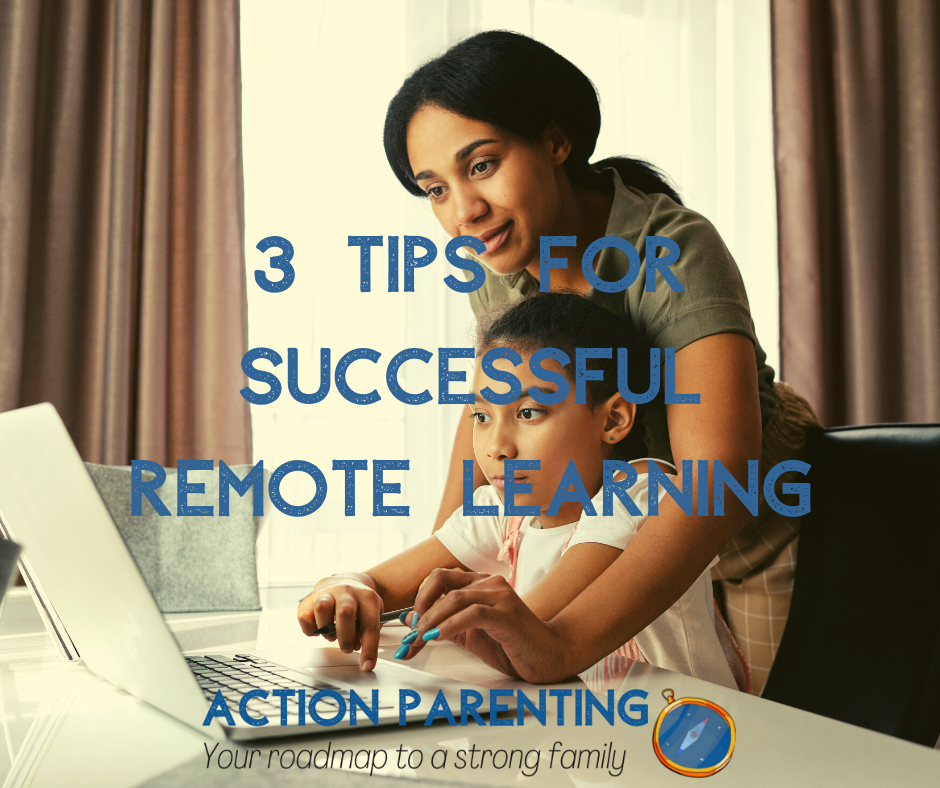For many families across the United States and world, the school year is starting not in the school classroom but rather in our homes. The recent memories of the spring and schools quickly transitioning to remote learning with little notice or preparation on anyone’s part can leave us feeling overwhelmed and anxious about doing it again this school year.
I’ve had lots of conversations with parents about schooling at home and our struggle to balance work, life, and now more direct involvement in our children’s learning. And the conversations have been good and honest but also felt like there was a missing piece. Many of us are saying that we feel ill-equipped they feel to be teacher and parent. And that is a valid feeling, and we also have the opportunity to model for our children a growth mindset by doing something, even when its hard, and we have to learn along the way.

So I thought I’d get some help by asking my friend, veteran educator, for some tips for successful remote learning from perspective of both a mom and an educator. Here are her 4 tips that can help foster an environment of success and growth as we all learn how to do school at home.
Tip #1 – Collaborate on a Schedule
All of us work better when we have a rhythm and some predictability to our days. My educator friend reminds us of the value of working together to create the schedule. One idea is to brainstorm a list as a family of the things that need to happen every day, including school as well as household/life things and then, depending on the age of the child, give space for some autonomy in choosing when those things happen. For a preschool/kindergarten age child, they might get to choose the order in which they brush their teeth and get dressed. An upper elementary child might choose when they do their independent reading time. By the time a child is in middle school and high school, they can start to order their day and include time to connect with friends, engage in physical exercise, as well as their school day.
Tip #2 – Empower and Equip Your Student for Success
I don’t know about you, but with so many roles and things on our plates right now, it’s easy for me to fall into the trap of either doing the hard things for my kids or just avoiding them all together. My educator friend shared the idea of the “productive struggle” that really resonated with me. Just as we talked a few months ago about the power of boredom regarding creativity, so the power of the “productive struggle” is valuable in building, among many other things, autonomy and self-esteem.
As parents, our role in this can be helping set kids up for success. Here’s a few ideas:
- Schedule Routine Check-Ins: Maybe you start in the morning with a check-in and work together to make a list of tasks and goals for the day. You might start with “What’s your plan?” Another good check-in time might be the end of the school day. A great way to start this check in is “What did you accomplish today?”
- The Power of a Cheat-Sheet: Help your child create a document or a paper that is posted somewhere that provides links to their coursework, how to access their teacher, and any other information they need to be successful. Then, when they come ask for help, you can direct them to their “cheat-sheet” and therefore empower them to be successful on their own.
Tip #3 – Set Goals
Learning to set a goal, determining the steps to accomplish the goal, and doing it are important life lessons. We can help our children this school year set both academic and life goals. If reading is a challenge, maybe you work together to set a goal for the number of books your child will read each week, month, or term. If it’s a challenging goal for your child, think about what might help with motivation. Maybe it’s a reward of some type for accomplishing the goal or a celebration.
While academic goals are important, my educator friend reminded me of the importance of setting personal goals as well. Is there something your child wants to learn or do? With limited sports and extracurricular activities, maybe this is a great time to learn that new skill or activity. I know I have been personally surprised at what my own kids are learning during this time.
Tip #4 – Celebrate!
I appreciated this tip because it can become so easy to focus what’s not workings, especially if you have a student who is not thriving in the virtual learning platform. Even if they don’t get the “right answer,” celebrate their progress, their determination to try new things, or their understanding of the bigger concept even if a small part was off. My educator friend mentioned that this is a big part of the classroom environment in a traditional learning model that she is learning how to replicate in the virtual classroom and as parents, we can help grow our children’s desire and ability to do hard things by celebrating the big and little accomplishments.

